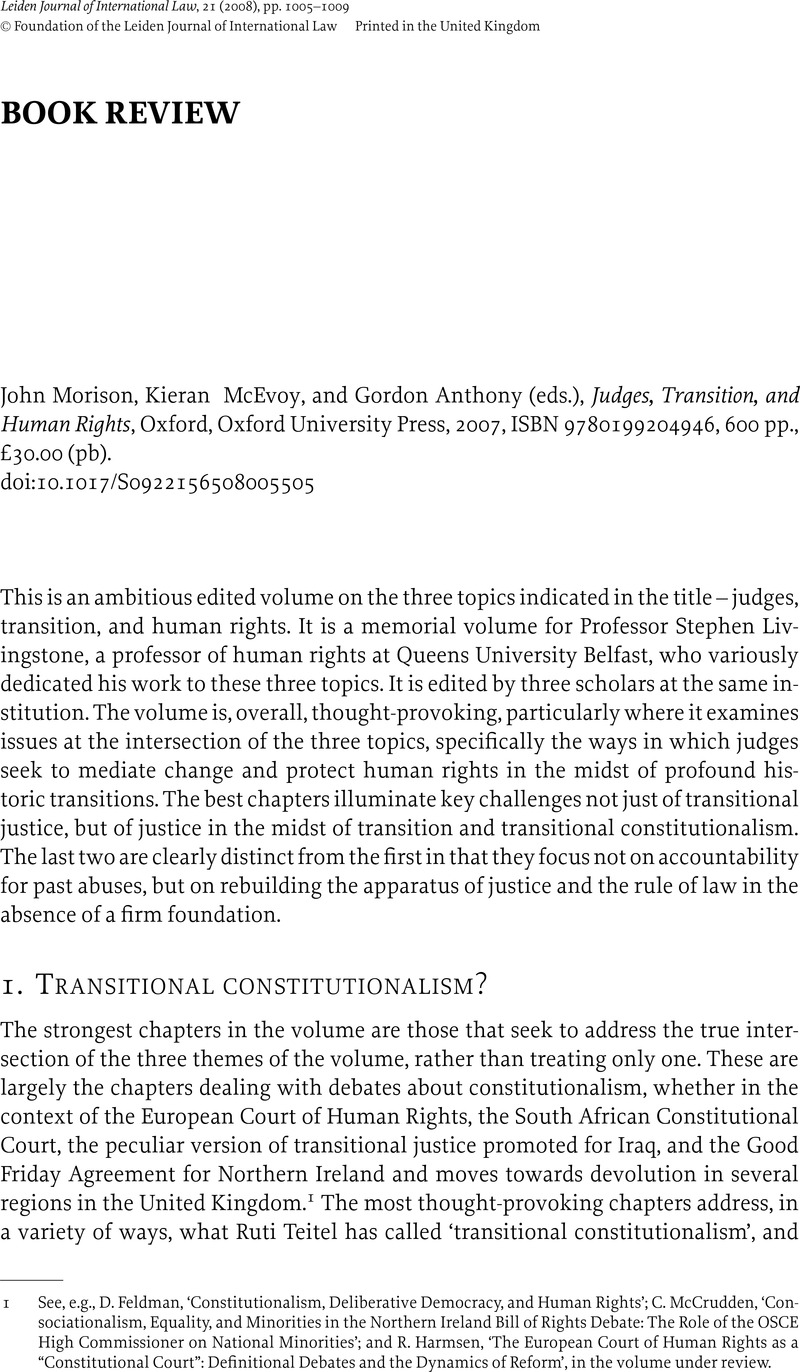No CrossRef data available.
Published online by Cambridge University Press: 01 December 2008

1 See, e.g., D. Feldman, ‘Constitutionalism, Deliberative Democracy, and Human Rights’; C. McCrudden, ‘Consociationalism, Equality, and Minorities in the Northern Ireland Bill of Rights Debate: The Role of the OSCE High Commissioner on National Minorities’; and R. Harmsen, ‘The European Court of Human Rights as a “Constitutional Court”: Definitional Debates and the Dynamics of Reform’, in the volume under review.
2 R. Teitel, Transitional Justice (2000), 210.
3 H. Hart, The Concept of Law (1961), 91–4.
4 H. Corder, ‘Judicial Policy in a Transforming Constitution’, in the volume under review, at 99.
5 J. Morison and M. Lynch, ‘Litigating the Agreement: Towards a New Judicial Constitutionalism for the UK from Northern Ireland?’, in the volume under review, at 139.
6 T. Hadden, ‘Human Rights and Conflict Resolution’, in the volume under review, at 178–9.
7 R. Teitel, ‘Transitional Justice Genealogy’, (2003) 16 Harvard Human Rights Journal 69.
8 C. Bell, C. Campbell, and F. Ní Aoláin, ‘The Battle for Transitional Justice’, in the volume under review, at 161–2.
9 G. Quinn, ‘Dangerous Constitutional Moments: The “Tactic of legality” in Nazi Germany and the Irish Free State Compared’, in the volume under review, at 225–37.
10 I am grateful to the editors of the journal for suggesting a discussion of these important points in an earlier draft.
11 Slaughter, A.-M., ‘Judicial Globalization’, (2000) 40 Virginia Journal of International Law 1103Google Scholar; and Koh, H. J., ‘Bringing International Law Home’, (1998) 35 Houston Law Review 623Google Scholar. See also Drumbl, M. A., ‘Looking Up, Down and Across: The ICTY's Place in the International Legal Order’, (2003) 37 New England Law Review 1037Google Scholar; and Waters, M., ‘Creeping Monism: The Judicial Trend Toward Interpretive Incorporation of Human Rights Treaties’, (2007) 107 Columbia Law Review 628Google Scholar.
12 M. S. Flaherty, ‘Separation of Powers in a Global Context’, and McCrudden, supra note 1, in the volume under review.
13 See, e.g., the creation in the UN of Office of Rule of Law and Security Institutions (OROLSI), and the presentation of The Rule of Law and Transitional Justice in Conflict and Post-conflict Societies: Report of the Secretary-General, UN Doc. S/2004/616 (23 August 2004), and the Set of Principles to Combat Impunity, latest update, UN Doc. E/CN.4/2005/102/Add.1 (8 February 2005).
14 This may be a particular risk where new and externally driven judicial processes, whether hybrid or transnational, are seen as undermining a country's sovereignty by imposing extra-national laws and judges. There have been such allegations about the Special Court for Sierra Leone and the exercise of universal jurisdiction, as I discuss in C. L. Sriram, Globalizing Justice for Mass Atrocities: A Revolution in Accountability (2005).
15 This is not to suggest that formalizing knowledge and approaches is a bad thing; indeed, responses might otherwise be wildly ad hoc.